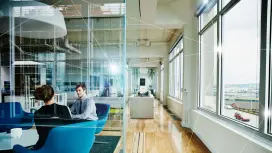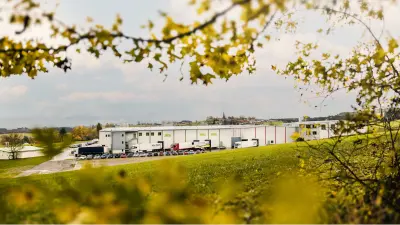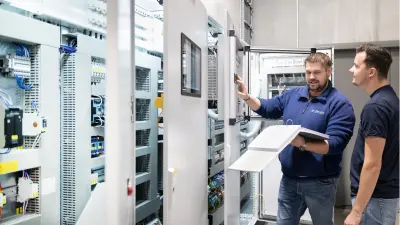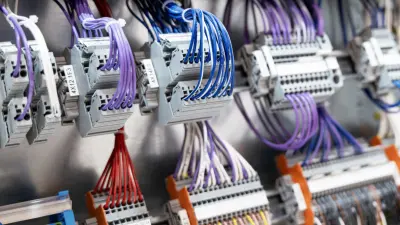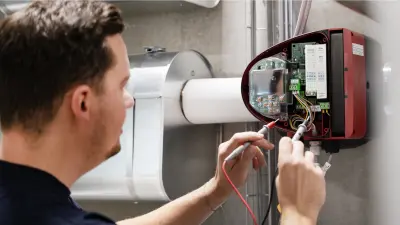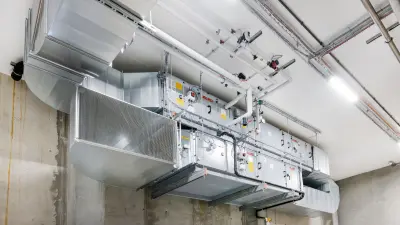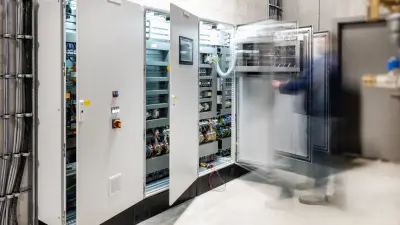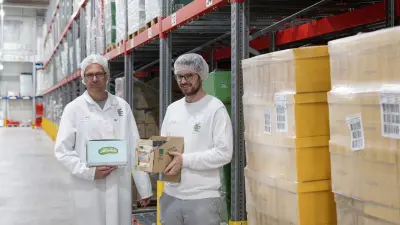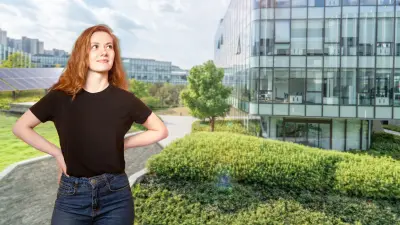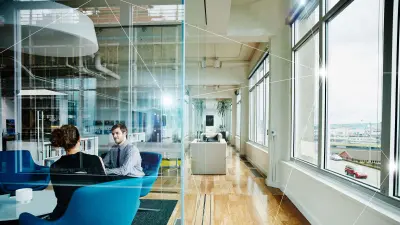A building automation solution for Allgäu Milch Käse eG ensures high energy efficiency
Without an intact agricultural sector, there’s no milk and without milk also no cheese. Allgäu Milch Käse eG, a 1300-member dairy cooperative in southern Germany’s beautiful Allgäu region, has been firmly committed to producing as sustainably as possible for many years. This puts it among the pioneers in its sector. Now it’s able to save even more natural resources by utilizing waste heat – thanks to building automation specialist Hörburger GmbH, which joined the Bosch family in 2022.
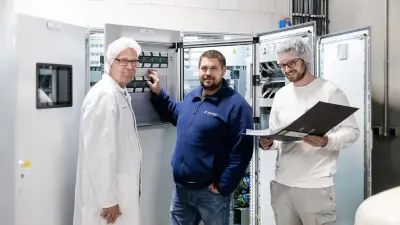
An idyllic mountain panorama, lush meadows dotted with grazing cows, crystal-clear lakes: the Allgäu, with its picture postcard scenery, is one of Germany’s most popular holiday destinations. Allgäu Milch Käse eG, based in the village of Kimratshofen (population 1200) between Kempten and Leutkirch, also owes its success to nature. It has been producing high-quality cheeses for over 60 years, and added organic products to its portfolio in 1988.
Well aware that bountiful quantities of milk for making cheese can only flow as long as nature remains intact, the cooperative is investing in technical solutions to ensure greater sustainability. Its latest project, a new storage and shipping hall, is a good example. A building automation solution installed by Hörburger GmbH, a subsidiary of Bosch Energy and Building Solutions, plays a starring role in it. “Among other things, our solution now lets us take advantage of waste heat, which would otherwise simply dissipate, as a valuable energy source,” explains project leader Martin Hartmann, who has loved cheese for as long as he can remember. “If you grow up in the Allgäu you can’t help but like cheese, milk, and butter,” he says. “And I’m proud of our automation solution, which is making an important contribution to the sustainability strategy of Allgäu Milch Käse eG.”
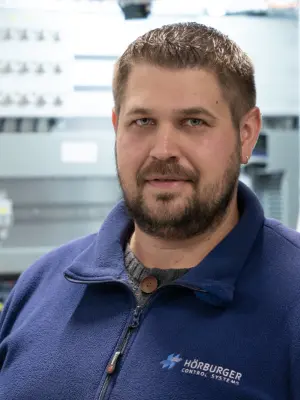
We’re taking advantage of the waste heat. It’s there in any case and therefore available cost-effectively.
Consistent devotion to protecting the environment
The products of Allgäu Milch Käse eG, which processes around 400 million kilograms of milk annually, are sold throughout southern Germany and in other countries under the Allmikäs brand name. In recent years the cooperative has invested several million euros to reduce the environmental footprint of its processing equipment. To achieve this, the dairy enterprise built its own cogeneration plant and completely covered the roof of its creamery, where quark and butter are produced, with solar panels. It also invested in a refrigeration plant and, together with a neighboring cheese producer, a power plant. “As a cooperative with deep regional roots, we want to set an example for others in terms of sustainability,” says Hubert Dennenmoser, who has been with Allgäu Milch Käse eG for 30 years. “The region’s dairy farmers depend on an intact environment to produce high-quality milk.”
Building automation for efficient use of waste heat
The shipping and storage hall was inaugurated in the fall of 2023. This major project also underscores the cooperative's commitment to the environment. The new structure now makes it possible to keep all of the value-adding steps in-house, up to and including shipping. The cheese is cooled, divided into small portions by a new cutting machine, and then packed and prepared for forwarding. All of these steps used to be performed by external service providers. Many truck trips have therefore now been eliminated, as well as packaging materials such as cardboard and plastic that used to be needed for transporting the cheese.
It was clear from the start that it was also important to implement the power supply of the shipping and storage hall so as to minimize resource consumption. This is where the building automation solution from Hörburger GmbH comes into play. “Now we’re taking advantage of the waste heat given off by the processing equipment, air compressors, and chillers. It’s there in any case and available for us to use very cost-effectively. We’re taking advantage of it to heat other areas including the offices and break rooms, as well as the hall itself in the wintertime if the temperature drops below the required minimum of nine degrees Celsius,” explains Hörburger expert Martin Hartmann. The building automation solution optimally networks and controls the building systems and processing equipment, thus ensuring an efficient and cost-effective operation.
Intelligent technology for energy-optimized interplay
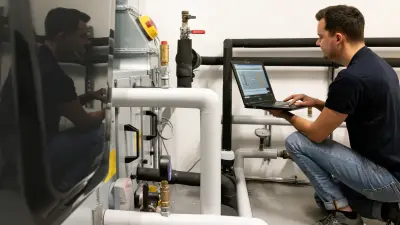
The solution from Hörburger GmbH controls the ventilation systems in the shipping and storage hall while adjusting cooling, heating, and the use of outdoor air as required. A cold chain plays a central role throughout the entire production chain. Now, however, the waste heat given off by the refrigerating systems is captured and used for heating. The processes are regulated by a controller that monitors the temperature, pump states, valve positions, outside temperature, and other parameters. If it gets too cold, the heating comes on. Conversely, if it gets too warm, the air is cooled. “All of this happens automatically, controlled by timed programs in response to the outdoor temperature or indoor conditions,” explains Hartmann. “The customer sets the desired values and times, and our system does the rest completely automatically.”
Conclusion
The members of the Allgäu Milch Käse eG cooperative see the investments in sustainability as a long-term project. “Conserving resources is an integral part of our commitment to sustainability,” says managing director Hubert Dennenmoser. “It’s necessary and sensible to deploy new technologies to achieve it. This also includes the building automation solution for our new shipping and storage hall. All of the measures taken reduce costs, save energy, and help protect the climate.”
